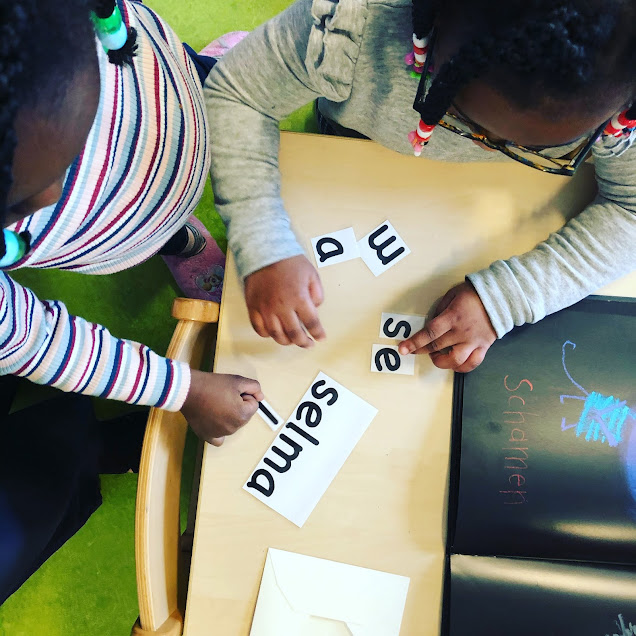PLAY AS A 'SELF-RENEWING RESOURCE'
And then it 'all of a sudden' feels like 'things are falling into place'. There are so many connections, questions, requests and discoveries that it is sometimes hard to keep track of everything that is going on. A 'domino game' that started with small blocks reappears at the light table, notes are written everywhere, a child wants to go to the forest to look for squirrels, another one really wants to visit a princess house, water colour paintings dry on the rack, a group of children is pretending to travel on the bus and I stand there mesmerised by the beauty of what unfolds around me.
What I notice is what Seth Godin describes so beautifully in one of his latest blog posts about initiative (https://seths.blog): we’re not going to run out. It’s a self-renewing resource. He writes 'the only way to get initiative is to take it. It’s never given.' which speaks to me about the power of choice and the ability for children to direct their learning through play. Young children never stop playing and are incredibly resourceful in finding new possibilities. Play truly is a space for initiative which shapes the learning that is going on. Sometimes research is initiated independently, at other times a small group may take charge of something before others do:
How do I write my name?
How do people communicate through writing?
How tall am I?
How does it move?
How do I make green?
How does an insect behave?
What belongs together?
What sound does it make?
How do I share my learning with others?
I followed up on the requests to visit a princess house. I asked Aya where we should go and she said 'Well, you know." I had to tell her that I don't know where to find the princess house. Apparently 'you have to find the dragons, if you find them, you find the princesses'. I am thinking of going along with Aya's thinking by proposing to create our own princess house and involving the children in the construction of this new play space. I wonder where this will take us and what it will reveal about the children's relationships with each other and their surroundings. I am hoping they will become even more aware that they can shape the classroom space and the learning just as much as I do.
I wonder:
What kind of initiatives have you noticed lately with your students?
How do you document these moments and how does it inform your planning?
How do you engage with requests, theories or interests that may feel 'uncomfortable' (for example weapon / superhero play or conversations about death)?
Seth Godin reminds us that many of us have been educated or raised in such a way that initiative was not valued and taken away from us. Early childhood settings that value play provide a space for agency. This is how young children learn about themselves and others and how to live together.
I wonder:
What kind of initiatives have you noticed lately with your students?
How do you document these moments and how does it inform your planning?
How do you engage with requests, theories or interests that may feel 'uncomfortable' (for example weapon / superhero play or conversations about death)?
Seth Godin reminds us that many of us have been educated or raised in such a way that initiative was not valued and taken away from us. Early childhood settings that value play provide a space for agency. This is how young children learn about themselves and others and how to live together.












What to document and how it supports planning... Good questions. I struggle to decide what should be documented and which parts should guide my planning as so much goes on. Who's ideas do I follow? Can I support their ideas? (I found last week that my creative skills weren't as advanced as 2 kids in my class so I couldn't actually think what to give them next to continue with their ideas. They were making astronaut costumes out of paper and paint!!! )
ReplyDeleteThanks for sharing your thinking with us Kirsty. I understand your questions around whose ideas to follow and then how to support their ideas. I often go along with the ideas that I can link back to our (very broad) enduring understandings. These are , at the moment, how our sense of identity develops through our relationships with others and the environment a year long unit about how our understanding of forces and nature is always evolving and involves critical thinking.
DeleteHow to support their ideas, theories and interest is another complex aspect of our work. I am inspired by Rinaldi who says something along the lines of ' we need to dip into our own creative capacity to generate ideas about how to support children with finding their own answers, solutions etc'.... start with listening for questions, theories or concepts that the children are researching, then think about ways you can support this research. For example, today we talked with the children about where they see reflections (after we observed them being delighted with observing their reflections in sensory bottles we created earlier). Very simple and yet effective as a way to think more deeply about reflections as a natural phenomenon.
Delete